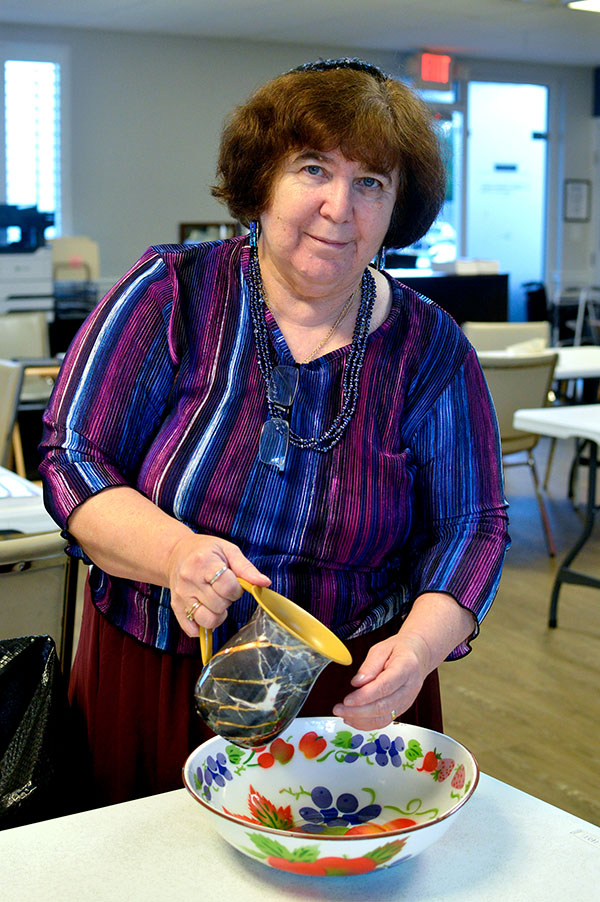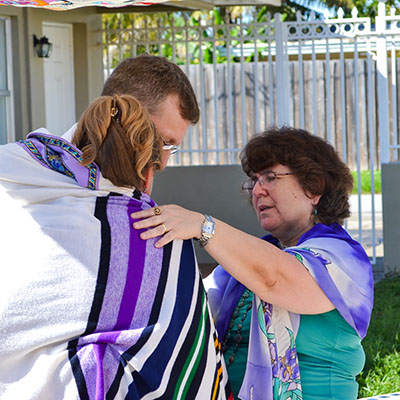THE RABBI
BY ELLEN GILLETTE

Port St. Lucie’s Shafir Lobb has been a woman with many identities. But while she’s changed her name, her address and her career multiple times, her rich life has made her the person she knew she was meant to be: Rabbi Shafir.
“My parents told me that I announced I was going to be a rabbi when I was 3,” Lobb recalls. “So it was clearly always a passion.”
But she had far more in store, in the meantime.
Her parents named her Jolan, for her paternal grand-mother. Lobb was born in Brooklyn, the baby of the family [“by far”] and the only daughter of immigrants. “When my parents met, they had to speak English,” Lobb says.
“My mother didn’t speak Hungarian and my father didn’t speak German.”
It wasn’t long before she acquired a nickname. “When I started [Hebrew] school I was going through a phase, picking a new name every day: tree, house, whatever popped into my brain,” she remembers. “That day it was Cookie. My parents mostly humored me, but the teacher thought she could cure me, so she said, ‘You can’t be Cookie because that’s my name.’ I answered, ‘OK, then call me Candy.’ She gave up and after that the kids all called me Candy. It stuck.”
Lobb’s mother had worked with the underground during World War II, helping move Jews to safety. “She dyed her hair blonde and flirted with the Nazi soldiers to distract them.”
In the United States, her mother worked in a variety of jobs, owning a beauty shop, pet store, weekly newspaper and jewelry store. “She was never a stay-at-home mother,” Lobb says, “but she was also never ‘not there.’ She was always open to new things.”
Lobb has traveled most of the country. Her father, a rabbi and psychologist, believed that resiliency should be developed and that children should experience different places. To that end, he took a series of interim positions between New York and California, where Lobb started school. She excelled at math and science. But at Philadelphia High School for Girls, Lobb became active in the Madrigal Singers.
“Which is amazing, because I can’t sing,” she says.
After graduation, she earned what was called a “pre-theo” degree in preparation for rabbinical school. At the time, it wasn’t all that common. The first female rabbi was ordained in the United States only 50 years ago. Much has changed since then. While only about a quarter of rabbis in the U.S. are female, Lobb says there are more women than men in rabbinical schools today.
When Lobb’s father died, however, plans changed. “The family’s economy shifted dramatically,” she recalls.
Living with her mother in Ohio, Lobb managed a flower shop. She also became a pilot. Because the shop’s busiest hours were mornings and evenings, Lobb worked a split shift. “In the afternoon, I took flying lessons.”
Eventually she became a flight instructor — and became particularly fond of her student, Bill Lobb.
“We met in March and married in August,” she recalls. “We had so many shared interests.”
Soon they shared a workplace. Lobb returned to school and got her mechanical engineering degree. She then joined Bill at Goodyear for 17 years, where she earned 11 patents. Once again, Lobb started another career. In her spare time, as interest in personal computers increased, she conducted seminars to train users.
The Lobbs also showed Chinese Cresteds and poodles at dog shows.
Although finances had originally delayed Lobb’s rabbinical studies, a traumatic experience threatened to dissuade her completely. The tallit is a traditional prayer shawl that, in some branches of Judaism, may only be worn by men. When Lobb entered her synagogue wearing one, the rabbi and 10 men walked out to conduct services elsewhere.
Upset, Lobb stopped attending services, unless her mother dragged her “from time to time.” It was when her mother passed away that Lobb returned to say prayers for the Kaddish, an important ritual of mourning in Judaism.
“Everything had changed,” Lobb says. “Women were welcome. It brought me back, reignited my desire.”
Bill, who is also Jewish, was supportive. “It didn’t bother him to have a female flight instructor,” Lobb says, “so clearly gender was not an issue.”
After completing her training, Lobb served as a rabbi in Tucson, Arizona.
“The congregation preferred my Hebrew name, Shafir, to ‘Rabbi Candy,’” Lobb says.
Out west, Lobb served on various boards including the Tucson Board of Rabbis, the Jewish Federation of Southern Arizona, Jewish Children’s and Family Services, and the Jewish History Museum.
After eight years, the Lobbs moved to Port St. Lucie to support extended family. At first, Lobb taught at Indian River State College. Today, she teaches full-time at Keiser University and is an adjunct professor for IRSC.
“The students I see have mostly good attitudes,” she says. “They’re more accepting of and open toward each other than previous generations. At the same time, our school system’s failing them. [Students] don’t come to college with all the skills they need to be successful: basic writing skills, creative thinking, time management, self-discipline. The current generation is tech dependent, but not necessarily tech savvy.”
Formerly with Temple Beth El Israel, Lobb was asked to lead a new Reform congregation, Eitz Chayim [Tree of Life]. It meets Friday evenings and Saturday mornings in the Community Center at St. Andrew’s Lutheran Church on Prima Vista Boulevard.
Eitz Chayim is growing quickly, attracting more attendees for their quarterly Shabbat Under the Stars and for high holy days such as Rosh Hashana, coming this year on Sept. 15-17. “The Jewish population here is higher than you would think,” Lobb says.
Reform congregations are the most liberal branch of Judaism. “More of the service is in English [as opposed to Hebrew] and the only dietary restrictions are no pork or shellfish. There’s a lot of singing, a lot of congregational participation.”
Around pastoral duties — services, counseling, weddings and funerals — Lobb teaches philosophy and religion, and coaches doctoral students via Wyzant, a tutoring resource, on Zoom. Her Ask a Rabbi show airs Friday mornings at 10 on WPSL. She has also authored numerous books, which are available on Amazon.
Lobb provides counseling beyond her congregation, including grief counseling.
“One of the problems is that a child loses his bike and you get him another bike,” she explains. “The child loses a puppy; you buy another puppy. Then the child loses Grandma. You can’t get a new grandma, right? But we haven’t taught the child to grieve.”
Lobb says we need to know how to deal with intense emotions.
“We act as if death is a penalty rather than the natural conclusion of life,” she says. “Sometimes God picks the flower in full bloom or as a bud, just as the gardener sometimes takes the prettiest flowers into the house.”
Thinking of her parents recently, Lobb had an epiphany.
“I thought, ‘Oh, my gosh, I’m copying my father, full circle.’ And my mother did multiple things, a teacher of beauty culture but also of Hebrew.”
Fluent in three languages, Lobb’s favorite biblical phrase comes from Leviticus.
“ ‘Love your neighbor as you love yourself’ means remembering to love your neighbors and wanting the best for them,” she says. “But it also means that you can’t do that unless you love yourself.”
Peace and healing start within the individual, Lobb says.
“Many of our conflicts come from unresolved personal garbage. Be kind to the person who looks back to you in the mirror.”
JOLAN SHAFIR LOBB
Age: “Sixty-ish.”
Lives in: Highland Park area of Port St. Lucie
Occupation: Rabbi and professor
Family: Husband, Bill, and “our fur babies”: dogs, Shadow and Imp; cats, Fuller and Shelby. “And one bearded dragon named Figment — no fur.”
Education: Bachelor of Arts, Ursinus College
[Pennsylvania]; Bachelor of Science, Akron University
[Ohio]; Master of Business Administration, University
of the People [online]; doctoral degrees in education
and psychology, Northcentral University [California];
licensed mental health counselor, Liberty University
[“I’m finishing up.”]
Hobbies: photography, gardening, walking, art
Who inspires me: “My dad and my mom, certainly; in the field of psychology, Piaget.”
Something most people don’t know about me:
“I was a captain in the Air National Guard, honorably discharged.”

See the original article in print publication
Sept. 5, 2023
